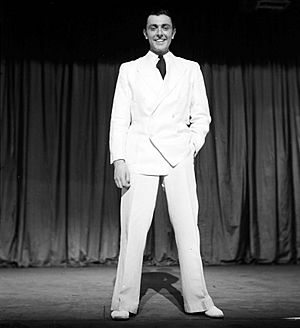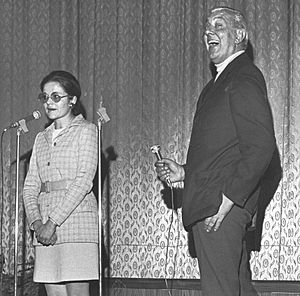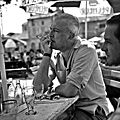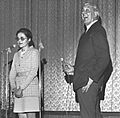Jacques Tati facts for kids
Quick facts for kids
Jacques Tati
|
|
|---|---|
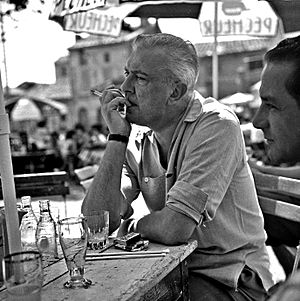
c. 1961
|
|
| Born |
Jacques Tatischeff
9 October 1907 Le Pecq, France
|
| Died | 5 November 1982 (aged 75) Paris, France
|
| Occupation | Filmmaker, actor, screenwriter, director |
| Spouse(s) | Micheline Winter (1944–1982; his death) |
| Children | 3 |
Jacques Tati (born Jacques Tatischeff, 9 October 1907 – 5 November 1982) was a famous French mime, filmmaker, actor, and screenwriter. He is known for directing only six full-length movies, but these films were very special. For example, his movie Playtime (1967) was ranked among the greatest films ever made in a 2022 poll.
Tati was seen as a true "auteur" in filmmaking. This means he was the main creative mind behind his movies, shaping a unique view of the world through his films.
Contents
Family background
Jacques Tati had a mix of backgrounds, including Russian, Dutch, and Italian. His father, Georges-Emmanuel Tatischeff, was born in Paris. Georges-Emmanuel's father, Dmitry Tatishcheff, was a Russian General who worked at the Russian embassy in Paris. The Tatischeffs were a noble family from Russia.
While in Paris, Dmitry Tatishcheff married a French woman named Rose Anathalie Alinquant. Georges-Emmanuel's mother brought him back to France when he was a child. They settled near Paris, in a place called Le Pecq.
In 1903, Georges-Emmanuel married Marcelle Claire van Hoof, who was Dutch-Italian. They had two children, Natalie and Jacques. Claire's father owned a well-known picture-framing company in Paris. Georges-Emmanuel joined the family business and later became its director. This meant the Tatischeff family lived a comfortable life.
Early life and comedy beginnings
Tati wasn't very interested in school, but he was good at tennis and horse riding. He left school at 16 in 1923 and learned picture framing in his family's business. From 1927 to 1928, he served in the military with the Cavalry.
After the military, he worked in London, where he first learned about rugby. When he returned to Paris, he joined a semi-professional rugby team. It was here that he discovered his talent for comedy. He would entertain his teammates by imitating their funny moves during games.
Around 1931–1932, a big economic crisis, the Great Depression, reached France. Tati decided to leave both his rugby team and his family's business. This was a big change, as he gave up a comfortable life to become a performing artist during tough times. He started creating physical comedy routines, which he called Impressions Sportives (Sporting Impressions). He performed these in amateur shows each year from 1931 to 1934.
Filmmaking career
First steps in entertainment
Tati's comedy act was first noticed in 1935 when he performed at a special event for a newspaper. Important people, like the writer Colette, saw his act. He was then hired to perform at the Theatre-Michel, where he quickly became a star. He also performed in London and at the ABC Théâtre in Paris until World War II began.
In the 1930s, Tati started trying out film acting. He appeared in several short films, including:
- Oscar, champion de tennis (1932)
- On demande une brute (1934)
- Gai dimanche (1935)
- Soigne ton gauche (1936)
World War II and after
In September 1939, Tati joined the military again for World War II. He was part of the Battle of Sedan in May 1940. After the war, he returned to Paris and continued performing his Sporting Impressions at the Lido de Paris from 1940 to 1942.
He also acted in the film Sylvie and the Ghost. During this time, he met Fred Orain, a studio director.
Tati becomes a director
In 1946, Jacques Tati and Fred Orain started their own film company, Cady-Films. This company produced Tati's first three movies.
In most of his films, Tati played a clumsy and awkward character named Monsieur Hulot. With his unique raincoat, umbrella, and pipe, Hulot became one of the most memorable comedy characters in movies. Tati's films often explored themes like society's focus on material things, the fast pace of modern life, and how technology can sometimes be cold and impractical.
L'École des facteurs (The School for Postmen)
Tati directed and starred in this short comedy in 1947. It was about a postman in the countryside. The film was very popular and won an award for film comedy.
Jour de fête (The Big Day)
Tati's first big movie was Jour de fête (The Big Day), released in 1949. It tells the story of a clumsy village postman who gets inspired by a documentary about fast American postal service. He then tries to deliver mail at hilarious speeds on his bicycle. Tati filmed it in a village where he had stayed during the war.
The movie was first shown in London and then in France, where it became a big hit. It won an award in 1950. Tati had wanted to film it in color, but the new color technology wasn't ready, so it was released in black and white. Later, his daughter helped restore and release the color version in 1995. The film also won an award at the Venice Film Festival.
Les Vacances de Monsieur Hulot (Monsieur Hulot's Holiday)
Tati's second film, Les Vacances de Monsieur Hulot (Monsieur Hulot's Holiday), came out in 1953. This movie introduced the character of Mr. Hulot. It follows his funny adventures during a summer vacation at a beach resort in France. The film gently made fun of different types of people and their habits.
The movie was filmed in a small seaside village, where a statue of Tati has since been placed on the beach. Critics loved the film, and it was even nominated for an Oscar for Best Original Screenplay. This movie is still one of the most loved French films from that time. Its humor has influenced other comedians, like Rowan Atkinson's character Mr. Bean.
After this success, Tati faced some delays. He had a car accident and then a disagreement with his film company. He decided to start his own company, Spectra Films, in 1956.
Mon Oncle (My Uncle)
Tati's next film, Mon Oncle (My Uncle), was released in 1958 and was his first film in color. The story is about Mr. Hulot's funny struggles with modern life and the new American-style consumerism in postwar France. It also shows his sweet relationship with his nine-year-old nephew, Gérard.
Mon Oncle quickly became popular around the world. It won an Oscar for Best Foreign Language Film, a special award at the Cannes Film Festival, and an award from New York film critics. In a town near Paris, there's a bronze statue of Tati as Monsieur Hulot talking to a boy, just like on the movie's poster.
When Tati received his Oscar, he asked to meet famous silent film comedians like Stan Laurel, Mack Sennett, and Buster Keaton. Keaton reportedly said that Tati's use of sound in his films continued the true spirit of silent movies.
Playtime
Many people consider Playtime (1967) to be Tati's greatest work. It was a very ambitious, risky, and expensive film to make. It took nine years to complete, and Tati had to use a lot of his own money. At the time, Playtime was the most expensive French film ever made.
For the movie, Tati famously built an entire mini-city made of glass and steel, nicknamed "Tativille," on the edge of Paris. This huge set took years to build and put him deeply in debt.
In the film, Mr. Hulot and some American tourists get lost in this futuristic, modern Paris. The city is full of glass and steel, showing a world that has become very commercial and globalized. Only human nature and glimpses of the old Paris bring life to this new, sterile city. Playtime had very little plot, and Tati made his characters, including Hulot, almost small parts of his bigger picture of a robotic Paris.
The film was originally very long, but Tati released shorter versions later. Even though critics praised Playtime (one called it "a film that comes from another planet"), it was a huge and expensive failure at the box office. This led to Tati going bankrupt. He was forced to sell his family home.
In 1969, with fewer resources, Tati started a new company, CEPEC, for his film and TV projects.
Other projects from Playtime era
While making Playtime, Tati also made a short film called Cours du soir (Evening Classes, 1967). In it, he teaches a class of aspiring actors about the art of comedy.
In 1971, Tati made a funny advertisement for England's Lloyds Bank. He showed a future bank where machines handled everything, but the ad's message was that you could still talk to a friendly person at Lloyds.
Trafic (Traffic)
Trafic (Traffic), released in 1971, brought Monsieur Hulot back to the screen. It was the last Hulot film and continued to playfully make fun of modern society. In the movie, Hulot is a clumsy inventor traveling to an exhibition with a special recreational vehicle full of gadgets.
Parade
Tati's last completed film, Parade, was made for Swedish television in 1973. It's mostly a filmed circus performance, showing Tati's mime acts and other performers.
Forza Bastia
In 1978, Tati started filming "Forza Bastia", a short documentary about a football match. He didn't finish it, but his younger daughter, Sophie Tatischeff, later edited the footage, and it was released in 2002 after her passing.
Films that were not made
Confusion
Tati had plans for another film called Confusion. It was meant to be about a futuristic Paris where everything revolved around television, advertising, and visual images. The script still exists, but the movie was never filmed.
Film Tati No. 4 (The Illusionist)
Tati wrote a script in the late 1950s called 'Film Tati Nº 4'. It was a touching story about a magician, known only as the Illusionist, who travels through old music halls in Eastern Europe and takes a poor young woman under his care.
This script was later turned into an animated film called The Illusionist in 2010. The main character in the animated film looks like a cartoon version of Tati himself.
Personal life
In 1944, Tati married Micheline Winter. They had two children: a daughter, Sophie Catherine Tatischeff, born in 1946, and a son, Pierre-François Tatischeff (also known as Pierre Tati), born in 1949. Both Pierre and Sophie later worked in the French film industry.
Death
Jacques Tati passed away on 5 November 1982, at the age of 75, due to a lung problem. He left behind a final script, Confusion, which he had finished with his friend Jacques Lagrange.
A French newspaper reported his death with the headline: "Farewell, Monsieur Hulot. We mourn him in his death, but we should have aided him while he was still alive!"
Legacy
Les Films de Mon Oncle
In the 1980s, Tati's children, Pierre and Sophie Tatischeff, worked to get back the rights to their father's films, which had been held by a bank. They succeeded, ensuring their father's work would be preserved.
In 1995, Sophie, with the help of a film expert, was able to release a color version of Jour de fête, just as Tati had originally wanted.
After her brother Pierre passed away, and knowing she was also ill, Sophie Tatischeff started a company called Les Films de Mon Oncle in 2001. Its goal is to protect, restore, and share her father's films with the world.
This company has worked hard to restore Tati's other films, including Playtime and My Uncle. These restored versions have been shown at film festivals and released on DVD and Blu-ray, allowing new audiences to discover Tati's unique movies.
Recognition and influence
In 1995, a cinema in France was renamed the L'Idéal Cinéma Jacques Tati in his honor.
In 2009, an exhibition about Jacques Tati was held in Paris, which even included a full-size model of the famous Villa Arpel from his film Mon Oncle.
Many comedians and filmmakers have said that Jacques Tati influenced their work. For example, Rowan Atkinson, who plays Mr. Bean, said that Tati's physical comedy in Mr. Hulot's Holiday was a major inspiration. He admired how Tati created funny situations that were purely visual and took their time to develop.
Independent animation director Bill Plympton also said Tati was a big influence. He liked that Tati's jokes were very visual, with not much talking, and that his humor was subtle, sensitive, and ironic.
Filmography
| Year | Title | Director | Screenwriter | Actor | Role | Notes |
|---|---|---|---|---|---|---|
| 1932 | Oscar, champion de tennis | Yes | Oscar | Short film | ||
| 1934 | On demande une brute | Yes | Yes | Roustabat | Short film | |
| 1935 | Gai dimanche! (Fun Sunday!) |
Yes | Yes | Unnamed tramp | Short film | |
| 1936 | Soigne ton gauche (Watch Your Left or Keep Your Left Up) |
Yes | Yes | Roger | Short film | |
| 1938 | Retour à la terre | Yes | Yes | Unknown | Short film | |
| 1946 | Sylvie et le fantôme (Sylvie and the Ghost) |
Yes | The Ghost of Alain de Francigny | |||
| 1947 | L'École des facteurs (School for Postmen) |
Yes | Yes | Yes | Postman | Short film |
| 1947 | Le Diable au corps (Devil in the Flesh) |
Yes | Officer at bar | |||
| 1949 | Jour de fête (The Big Day) |
Yes | Yes | Yes | François, the postman | |
| 1953 | Les Vacances de M. Hulot (Monsieur Hulot's Holiday) |
Yes | Yes | Yes | Monsieur Hulot | Also uncredited producer |
| 1958 | Mon oncle (My Uncle) |
Yes | Yes | Yes | Monsieur Hulot | Also producer |
| 1967 | Play Time | Yes | Yes | Yes | Monsieur Hulot | |
| 1967 | Cours du soir (Evening Classes) |
Yes | Yes | Monsieur Hulot | Short film | |
| 1971 | Trafic (Traffic) | Yes | Yes | Yes | Monsieur Hulot | Also uncredited editor |
| 1972 | Obraz uz obraz | Yes | Zak | Episode: "1.5" | ||
| 1974 | Parade | Yes | Yes | Yes | Circus performer | |
| 1978 | Forza Bastia | Yes | Yes | Documentary short | ||
| 2010 | The Illusionist | Yes | Original screenplay only |
Awards
- Cannes Festival (1958): Grand Prix for Mon Oncle.
- Academy Awards (1958): Best Foreign Language Film for Mon Oncle.
- 6th Moscow International Film Festival (1969): Silver Prize for Playtime.
- An honorary César (1977) from the French Film Institute for his lifetime contributions to cinema.
Images for kids
See also
 In Spanish: Jacques Tati para niños
In Spanish: Jacques Tati para niños
 | Georgia Louise Harris Brown |
 | Julian Abele |
 | Norma Merrick Sklarek |
 | William Sidney Pittman |


